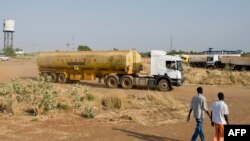The South Sudan government on Wednesday dismissed claims by rebels loyal to former vice president Riek Machar that they have seized control of the strategic oil facilities at Palouch, in Upper Nile state.
Government spokesman Michael Makuei insisted Palouch is "fully in the hands of the government," denying the rebels’ claim they control the largest oil block in the country.
The military spokesman for Machar's rebel movement, Col. Lony Ngundeng, told South Sudan in Focus that opposition forces captured Palouch late Tuesday.
"The main fields that are producing oil today, in Palouch, we have taken them over. This is a strategic victory because where does Juba get its supply of arms and ammunition? They get it from this area," he said.
Backbone of economy
Oil production brings in nearly all of the South Sudan government's revenues.
The U.S. Energy Information Administration (EIA) says on its website that oil production in South Sudan has been "partially halted" since the country plunged into conflict in December 2013. The U.S. agency said production has fallen from around 250,000 barrels per day in 2012 to around 160,000 barrels per day.
Several foreign oil companies pulled out of South Sudan when the fighting first broke out. In August of last year - eight months into the conflict - U.S. energy giant Exxon Mobil decided not to explore for oil with France's Total in Jonglei state, one of three states where fighting has been the most intense.
Currently, oil is produced in only two of South Sudan's 10 states - Unity and Upper Nile. Palouch is in Upper Nile. The Satellite Sentinel Project, which monitors the Sudans using satellite imagery, has said it has visual evidence of destruction in oil-producing states in South Sudan.
Collapsing economy
Seventeen months after the conflict began, some - including opposition leader Lam Akol - are saying that the economy is on the brink of collapse.
Akol told South Sudan in Focus that a big part of the problem is that President Salva Kiir’s administration has been diverting government revenues - 98 percent of which come from oil - that should have been used for development projects to pay for the conflict.
At least 40 percent of South Sudan’s annual budget is allocated to the security sector this year. And a report released last month by the Stockholm International Peace Research Institute (SIPRI) showed that South Sudan’s military spending increased from $982 million in 2013 to $1.08 billion in 2014, making the new nation the biggest military spender in the region.
Akol also said South Sudan’s debt has ballooned to $10 billion, much of which is loans secured against oil that were supposed to be used to strengthen the economy.
With oil production down by nearly half since the start of the conflict, the government is not selling as much oil as it used to, and is having difficulty repaying its loans. It is also having difficulty securing new loans because lenders have lost confidence in its ability to pay them back.
Akol said government spending needs to be cut and loans need to be negotiated transparently if South Sudan is to emerge from its crisis.
More than that, said Juba resident Rejab Muhandis, South Sudan's leaders need to "end the conflict and get back to work on other issues - setting up the governance system... addressing the economic crisis and putting in place the necessary infrastructure to be able to boost economic activities in the country.”
But ending the conflict has not proven to be an easy task. More than a year of peace negotiations led by the East African bloc, IGAD, stalled in early March when talks billed as the last chance to bring peace to South Sudan ended without a deal between Mr Kiir and Machar. Since then, fighting has picked up sharply in Unity and Upper Nile, the two oil-producing states.
